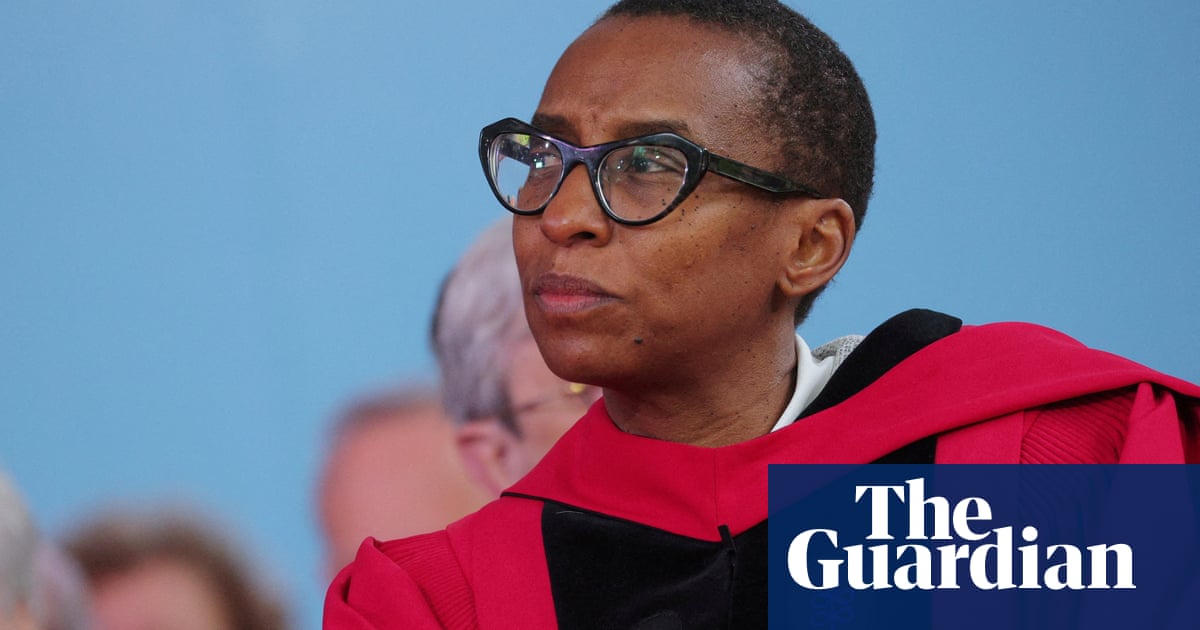
Any political observer who is not too stupid or too full of himself to notice what is going on knows that the resignation of Claudine Gay, the president of Harvard University who was driven from her job this week, had nothing to do with plagiarism.
There are all sorts of factors that make this obvious: there is the reality that Gay’s field, political science, is a data-driven discipline in which abstracts from one paper are not-infrequently copied as parts of a literature review in another, and that the borrowed phrases and summaries that account for Gay’s “plagiarism” are not crimes of theft but of sloppiness, with little bearing on the originality of her work.
There is the fact that Gay’s “plagiarism” scandal arose belatedly, brought up in tenuous relation to a similarly fatuous and opportunistic false claim by the Republican congresswoman Elise Stefanik that Gay had abetted antisemitism at Harvard. (The same accusation also led to the ouster, last month, of the University of Pennsylvania president, M Elizabeth Magill).
There is the fact that rightwing propagandists, prominently the anti-education crusader Christopher Rufo, openly admitted the pretextual nature of their plagiarism smear against Gay, and frankly spoke of their intention to manipulate the national media into creating a baseless controversy that would drive Gay, Harvard’s first Black president and only the second woman to lead the university, out of her job.
It is not just that Gay’s ouster has nothing to do with plagiarism: it is that it has nothing to do with Claudine Gay
But recounting all of this is tedious, and cedes the terms of the debate to the authors of this false controversy–fighting on their territory, arguing the questions they pose, giving good-faith rebuttals to allegations they do not pretend to believe even as they make them. As the sociologist Victor Ray put it, “Accepting the bad-faith framing is a choice to ally oneself with the bad-faith actors.”
But this is what much of the mainstream media, over the past weeks of the so-called “controversy” over Gay’s tenure at Harvard, has been doing with unnerving enthusiasm. Between her congressional testimony in December and her resignation on Tuesday, the New York Times alone published more than 60 items about Gay, breathlessly covering alleged plagiarism in her 25-year-old dissertation; CNN joined in, granting credulous coverage to claims that Gay had plagiarized in graduate school and granting airtime to claims made by the likes of Bill Ackman, a billionaire hedge fund manager and Harvard donor who openly stated that he hoped to dislodge Gay because of his disdain for “DEI”, – the corporate euphemism for racial integration efforts.
The flurry of coverage resulted in not so much a clear articulation of alleged misconduct by Gay as a vague fog of ill will that carried stench of scandal. The media seemed assured that Gay had done something wrong: maybe it was about academic integrity, or maybe it was about the supposed antisemitism on campus; maybe it was the racist subtext, all but declared by Gay’s rightwing critics, that a Black woman who attained a position of superlative prestige and authority could necessarily not have done so by merit. The media followed all this as if any of it was real, as if any of it mattered, proving themselves willing to serve as outlets for a rightwing propaganda effort that is wildly cynical, demonstrably sadistic, and avowedly indifferent to the truth.
In reality, it is not just that Gay’s ouster has nothing to do with plagiarism: it is that it has nothing to do with Claudine Gay. Her resignation is merely the latest episode in the rightwing’s assault on education – a project that has increased in its virulence and success in recent years, but which has been decades in the making. Republicans hate education, and they have demonstrated this hate in both their policymaking and in the public theater of their cultural grievance.
They defund and privatize public schools, and they attempt to make public enemies of teachers; they ban books, and force educators into the closet, and impose abstinence-only sex education. They manipulate Title IX to make universities hostile to women and deferential to rapists; they impose bizarre, invasive and lascivious rules that would compel period tracking and genital inspections for student athletes. They take over colleges and gut departments that might lead students to think critically about social hierarchies; through their partisans on the supreme court, they have now banned affirmative action in admissions. They dox student activists, harass and intimidate professors, and, now, purge administrators. This is the story that the media has been studiously ignoring, preferring to miss the forest of a coordinated anti-education effort for the trees of a flimsy, pretextual citation scandal. One has to ask: what are they so afraid of?
It may be that Republicans are hostile to education because they believe that the world they want to usher in – one in which hierarchies of race and gender are entrenched, naturalized and given the force of law – is not possible to impose except on a population that has been kept ignorant. But the fact is that if the university system were as strong an incubator of pro-equality, pro-democracy social forces as the Republican machine seems to think it is, then it would not be so vulnerable to such transparently bad-faith attacks.
In reality, the American university is weakened – low on public funding, reliant on underpaid, contingent and dissatisfied academic labor, and subject to the whims of very wealthy donors. In such conditions of precarity and scarcity, true freedom of thought has long been something of an fiction for academics and students alike, who know well, for instance, that they cannot report sexual harassment or openly support Palestinian freedom without inviting harassment or risking their careers.
Universities, at their best, remain sites of robust debate and challenging inquiry. But at their worst, they are sites of vampiric labor exploitation, of malign incentives for scholars, and, increasingly, of meddling by ambitious Republican operatives or politically appointed trustees. Gay can be forced to resign for transparently dishonest reasons because universities like Harvard are dependent on bad-faith actors who wanted her gone to pursue their own agendas – and because they lack the will to break this dependence.
Something similar might be said of the mainstream media. Many news outlets – much like universities – have been weakened by declines in revenue, and have largely failed to adapt to the rise of an anti-intellectual and anti-democratic right wing that is indifferent to the truth. Instead of covering the malfeasance of these actors, they have anxiously tried to maintain the appearance of neutrality – sometimes at the expense of frankly telling the truth. They, too, are dependent on the good will of the right – in the form of subscribers and sources alike. And they, too, have been manipulated in this dependence, becoming willing to use their platforms and prestige to lend legitimacy to faux controversies that otherwise would have not have any.
None of this is to say that Claudine Gay is an especially innocent or admirable figure. It is to say that her character does not much matter: no institution, no social movement, and no profession can survive if its survival depends on the moral perfection of all its main actors. Both the media and the American university system had an opportunity to see the attacks on her in the context of Republicans’ broader anti-education crusade – to treat the right wing’s bad faith for what it really was, and to treat Gay’s missteps for what they really were. They failed.
Moira Donegan is a Guardian US columnist












